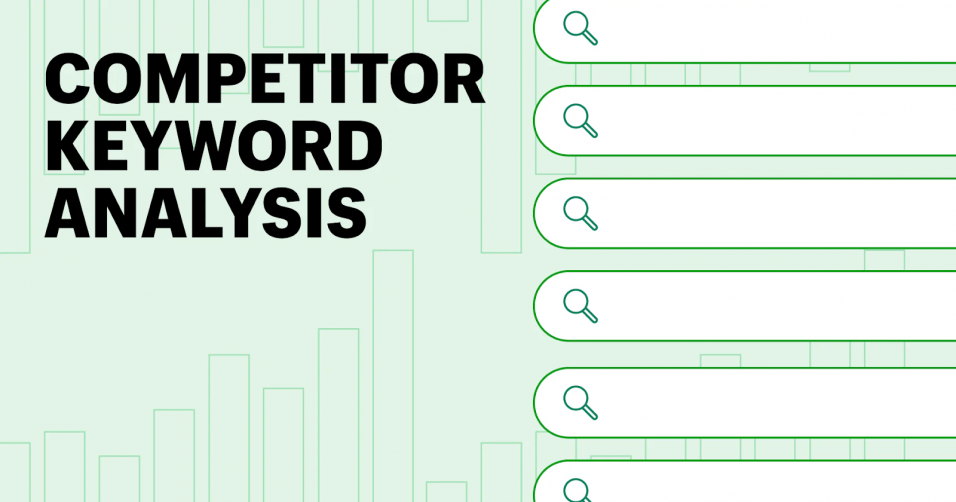
What is Competitor Keyword Analysis Tools?
Competitor keyword analysis is a powerful way to understand the SEO landscape and uncover strategies that help you outrank competitors. By analyzing the keywords your rivals target, you can discover new opportunities, optimize your content, and develop a more effective digital marketing strategy. In this blog, we’ll explore the best tools available for competitor keyword research and show how they can help you grow your online presence.
What is Competitor Keyword Analysis?
Competitor keyword analysis involves identifying the keywords your competitors use to rank on search engine results pages (SERPs). This process uncovers gaps in your own strategy, helping you target underutilized keywords, avoid overly competitive phrases, and develop a content strategy that meets user search intent.
Why is Competitor Keyword Analysis Important?
Uncover keyword gaps: Find keywords your competitors rank for but you don’t, allowing you to fill those gaps with targeted content.
Improve ranking potential: By understanding where your competitors excel, you can craft a strategy to outperform them.
Stay ahead of trends: Monitor keyword trends and adapt your content to changing demands.
Optimize paid ads: If your competitors are running successful PPC campaigns, analyzing their keywords can help improve your own advertising efforts.
Let’s dive into the top 10 tools for conducting competitor keyword analysis.
Top 10 Competitor Keyword Analysis Tools
SEMrush

Semrush is one of the best tool for competitor analytics
SEMrush is one of the most comprehensive tools available for competitor analysis. It allows you to see your competitors' organic and paid search strategies, backlink profiles, and keyword rankings. Its Domain Overview feature gives insight into which keywords your competitors rank for, while the Keyword Gap tool reveals opportunities where you can surpass them. SEMrush also provides detailed data on traffic trends, content strategies, and advertising campaigns, making it ideal for both SEO and PPC analysis.
Best for: All-in-one SEO, keyword research, and PPC analysis.
Key features: Domain overview, keyword gap analysis, backlink audit, and competitor tracking.
Ahrefs
Ahrefs is another robust tool that excels in competitor keyword research. It enables you to track competitor rankings, explore their top organic keywords, and discover which pages drive the most traffic. The Site Explorer tool provides a deep dive into competitor content and backlink strategies. Ahrefs also offers a Content Gap feature, which highlights keywords that your competitors rank for but you don’t.
Best for: Comprehensive competitor research and backlink analysis.
Key features: Site Explorer, content gap analysis, organic traffic analysis, and keyword ranking tracking.
If you're looking to maximize the benefits of Ahrefs without the high costs, choosing an Ahrefs group buy plan from Group Buy Expert is a smart solution. You can access all the powerful features of the Ahrefs Agency plan at a fraction of the price, making it ideal for those who want professional SEO tools without the hefty price tag.
Moz Pro

Moz Pro allows you to compare keyword rankings easily
Moz Pro stands out for its user-friendly interface and reliable keyword data. Its Keyword Explorer tool allows you to compare keyword rankings between websites and assess keyword difficulty. The Domain Analysis feature helps identify the keywords competitors are targeting, while the Keyword Difficulty score shows how challenging it would be to rank for those keywords. Moz Pro is especially helpful for understanding how competitors rank for specific keywords across organic search.
Best for: Easy-to-use SEO research with in-depth keyword difficulty analysis.
Key features: Domain analysis, keyword difficulty score, rank tracking, and keyword comparison.
SpyFu
SpyFu focuses on uncovering both organic and paid keyword strategies. It gives you access to your competitors’ entire keyword portfolios, including their best-performing organic keywords and the PPC terms they’re bidding on. SpyFu’s Kombat tool compares your keyword strategy with your competitors to identify missing opportunities. Additionally, its Ad History feature allows you to track the performance of competitors' paid ads over time.
Best for: In-depth PPC and SEO analysis with historical data on ad performance.
Key features: PPC keyword tracking, keyword Kombat tool, ad history, and competitive analysis.
Serpstat
Serpstat is a cost-effective option for small businesses looking to enhance their SEO strategy. The platform specializes in long-tail keyword research and competitor analysis. The Keyword Research tool allows you to discover your competitors' keywords, while the Tree View feature shows a detailed breakdown of your competitors’ content strategies. Serpstat also offers competitive insights into PPC campaigns, helping you optimize paid search efforts.
Best for: Affordable keyword research and analysis for SEO and PPC.
Key features: Long-tail keyword research, PPC analysis, and content strategy insights.
Majestic

Majestic is primarily known for its backlink analysis
Majestic is primarily known for its backlink analysis capabilities, but it also offers valuable competitor keyword research. The Majestic Keyword Tool allows you to identify keywords your competitors are ranking for, as well as potential gaps in your strategy. By combining keyword data with backlink information, Majestic helps you improve your SEO efforts through smarter keyword targeting and link-building.
Best for: Backlink-focused keyword analysis.
Key features: Keyword research, backlink analysis, and trust flow metrics.
Ubersuggest
Ubersuggest by Neil Patel is a free keyword research tool that offers basic competitor analysis features. It provides insight into competitors’ top-performing organic keywords, content, and backlinks. Ubersuggest’s Top Pages feature shows which competitor pages drive the most traffic and ranks their most valuable keywords. This tool is perfect for beginners or small businesses looking to get started with SEO.
Best for: Free keyword research and basic competitor analysis.
Key features: Top-performing pages, keyword suggestions, backlink analysis, and site audit.
Keyword Tool.io
Keyword Tool.io is popular for its ability to generate thousands of keyword suggestions from a single query. While it doesn’t provide direct competitor analysis, it’s useful for finding new keyword opportunities that your competitors might be overlooking. The tool supports multiple platforms, including Google, YouTube, Bing, and Amazon, making it a versatile option for businesses across industries.
Best for: Generating extensive keyword lists and identifying overlooked opportunities.
Key features: Keyword suggestions for various platforms, search volume data, and keyword filters.
BuzzSumo
BuzzSumo is an excellent tool for analyzing competitor content performance. It helps you identify which pieces of content generate the most social media engagement and backlinks. With the Content Analyzer, you can see which topics and formats resonate most with your competitors' audiences. This insight allows you to tailor your own content strategy and optimize it for better performance.
Best for: Content performance analysis and social media insights.
Key features: Content analyzer, backlink data, and social media performance tracking.
Raven Tools

Raven tool is available for competitor SEO analytics
Raven Tools offers a wide range of SEO and marketing features, including competitor keyword analysis. It provides detailed reports on competitors' keyword rankings, backlinks, and overall SEO performance. Raven Tools is particularly valuable for its Site Auditor feature, which analyzes how well your site is optimized compared to your competitors, helping you identify areas for improvement.
Best for: All-in-one SEO tool with detailed site auditing.
Key features: Competitor keyword tracking, backlink reports, and site audits.
How to Use Competitor Keywords for SEO Success
Once you’ve identified your competitors' keywords, it’s essential to put this data to good use. Here are some tips on leveraging competitor keywords:
Identify Keyword Gaps
Look for keywords your competitors rank for, but you don’t. Targeting these keywords can help you capture new traffic and fill gaps in your SEO strategy.
Focus on Long-Tail Keywords
While high-competition keywords may be difficult to rank for, long-tail keywords offer more specific search intent and are often easier to target. Tools like Serpstat and Ubersuggest excel in uncovering long-tail keyword opportunities.
Optimize Your Content
Once you know what keywords your competitors are targeting, create better content around those terms. Use insights from tools like BuzzSumo to see what formats work best and align your content with search intent.
Monitor Competitor PPC Campaigns
Tools like SpyFu and SEMrush allow you to analyze competitors' paid advertising strategies. By monitoring their PPC campaigns, you can improve your own ad performance and avoid costly bidding wars.
FAQs
Can competitor keyword analysis improve my PPC campaigns?
Yes. Tools like SpyFu and SEMrush allow you to see which keywords your competitors are bidding on in their PPC campaigns. This helps you optimize your own ads, avoid costly bidding, and target keywords that generate a higher return on investment (ROI).
How do I identify keyword gaps in my SEO strategy?
To identify keyword gaps:
Use tools like SEMrush or Ahrefs to compare your keyword portfolio with that of your competitors.
Identify keywords they rank for that your website is not targeting.
Create content around those keywords to capture new traffic.
What are long-tail keywords and why should I target them?
Long-tail keywords are more specific search terms that usually have lower competition and more focused search intent. Targeting these can help you rank faster and attract highly qualified traffic. Tools like Serpstat and Ubersuggest excel at finding long-tail keywords your competitors may not be using.
How often should I conduct competitor keyword analysis?
It’s recommended to conduct competitor keyword analysis at least quarterly. Regular analysis helps you stay on top of keyword trends, monitor competitors' SEO and PPC strategies, and adjust your own content to remain competitive in search rankings.
Conclusion
Competitor keyword analysis is an invaluable part of any SEO strategy. By understanding which keywords your competitors are ranking for, you can identify new opportunities, optimize your content, and stay ahead in search rankings. Tools like SEMrush, Ahrefs, and SpyFu make it easier to track competitors’ performance and uncover actionable insights that can boost your SEO efforts.


